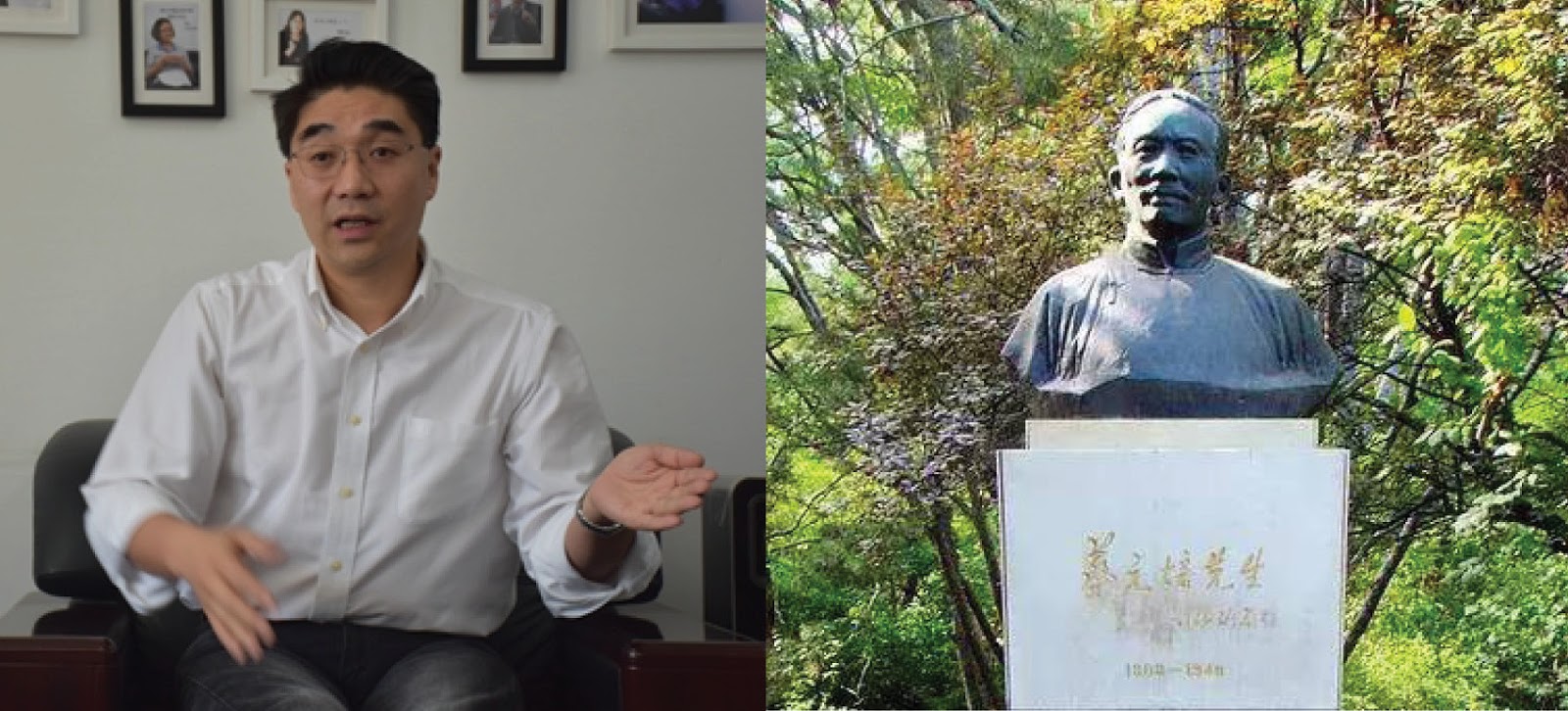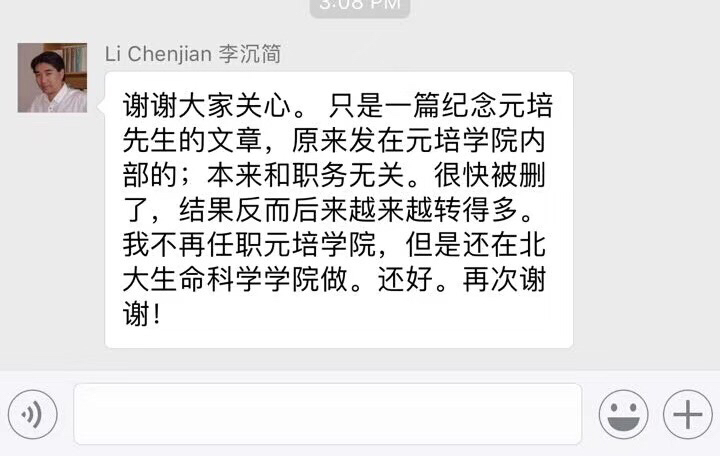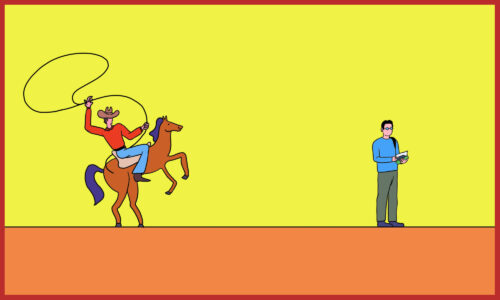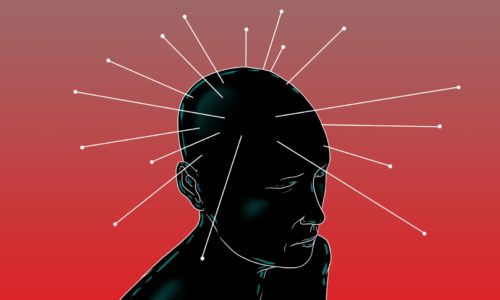‘Modern Chinese intellectuals are spineless’: Peking University vice dean reportedly resigns after provocative essay
‘Modern Chinese intellectuals are spineless’: Peking University vice dean reportedly resigns after provocative essay

Li Chenjian and Cai Yuanpei
Rumors are flying (in Chinese) at Peking University that Li Chenjian 李沉简, vice dean of the school’s Yuanpei College 元培学院, has resigned as vice dean after circulating an essay that rebukes his colleagues and Chinese intellectuals in general for rampant “shamelessness and cynicism,” and becoming increasingly “spineless” in fear of suppression from the establishment.
Judging from a screenshot of Li’s statement on WeChat, the article was a commemoration of Cai Yuanpei 蔡元培, an influential educator and former president of Peking University, only meant to be shared internally at Yuanpei College. But soon after its publication, the essay was censored, which only attracted more attention on social media. Li also said in the statement that though he had left Yuanpei, he would still teach at the university’s school of life sciences.

Radio Free Asia reports that online searches of the article yielded no results on Monday, and some internet users found their WeChat accounts suspended after sharing the essay on the platform.
When reached by Radio Free Asia, staffers at Yuanpei College declined to comment. And since Li hasn’t spoken to any media, the authenticity of the reports can’t be confirmed.
Below is our translation of Li’s post, dated February 28, 2018.
120 years after the Hundred Days’ Reform and the establishment of Peking University (PKU), we are commemorating former president Cai Yuanpei. In the history of modern China, Mr. Cai fully deserves to be called the father of modern education. His legacy — the belief in “embracing diversity and thinking freely” — is PKU’s spiritual torch that has been passed on from generation to generation. Although most people’s impression of Cai is of a thought leader who acted in the style of a modest gentleman, Cai had another facet to him that sets him as an example for the ages, which is of a real man with a straight spine who refuses to be a cynic.
Mr. Cai, in his early years, in order to resist the Qing Dynasty government, risked his life as a powerless student to organize and train a group of assassins dedicated to killing Qing officials. In the following decades, he identified with nothing but truth and never submitted to force. In his years as president of PKU, he resigned eight times in protest: In 1917, he resigned in opposition of Zhang Xun 张勋’s attempt to restore the Qing Dynasty; in May 1919, after the student leaders of the May Fourth demonstrations were arrested, he resigned in protest; at the end of 1919 and January 1920, he resigned in support of teachers in Beijing calling for a pay raise; in August and September 1922, he resigned after the government insulted him and delayed education funding; in 1923, Cai resigned in protest of the education bureau head’s violation of human rights and judicial independence; in 1926, he resigned when the government cracked down on students. In this sense, it was only after Mr. Cai made great personal sacrifices that his notion of “embracing diversity and thinking freely” made PKU at that time unprecedentedly active — including with the likes of the completely Westernized Hu Shi 胡适 [a key contributor to language reform, specifically the use of written vernacular]; Communism advocates like Chen Duxiu 陈独秀, Li Dazhao 李大钊, and Mao Zedong 毛泽东; as well as Gu Hongming 辜鸿铭, who still had his queue and aspired to restore the Qing Dynasty. Various schools of thoughts were born and clashed here.
Freedom is never free. Freedom has never fallen from the sky. Rather, it is earned through the heavy price paid by those with moral backbone, including many from Peking University’s previous generation: Hu Shi spent a lifetime daring to criticize Chiang Kai-shek 蒋介石 and Nationalist Party autocracy; Ma Yinchu 马寅初 [father of China’s family planning policy] persisted in his scholarly attitude, refusing to bow to criticism; Lin Zhao 林昭 never cowered in the madness of the Cultural Revolution, battling inhumanity and sin by herself until the very end, until her execution. Peking University’s ability to become a sacred Chinese palace was not only because of her ideology, but even more due to her students’ and teachers’ willingness to sacrifice for the cause.
However, we should be acutely and objectively aware that throughout China’s five thousand years of history, people with moral backbones were the minority, and there were many more who were soft-boned accomplices to tigers [those who assist evildoers]. During the War of Resistance Against Japan, China set a record in human history by having more puppet army troops than occupying troops; during the Great Leap Forward and Cultural Revolution, how many people were actually “blinded” and how many people shrewdly framed their colleagues to protect themselves in betrayal of their conscience, and how many people kicked others when they were down in order to win promotions?
Among ordinary people, cynical philosophies such as “you have to lower your head under the eaves” [something like “you have to live with reality”] and “better a live coward than a dead hero” are endorsed by many, but the shameless among high intellectuals are in no way fewer than among ordinary people. In ancient China, there were government officials who deliberately called a stag a horse and betrayed their own will to become sycophants. In modern China, there have been drifters like Guo Moruo 郭沫若 who were incredibly knowledgeable but constantly changed their stances. Even more terrifying are scientists like Qian Xuesen 钱学森, who, after receiving the best scientific training in this world at the California Institute of Technology, still kept on writing newspaper articles at great length embracing plain lies — unrealistic and exaggerated number of crop production during the Great Leap Forward. It rarely occurs to people that the primary reason we don’t have any notable scientists or masters of liberal arts is our education’s systematic nurturing of shrewd liars instead of advocates for truth. This has nothing to do with knowledge. It’s all about morality.
Why are cynicism and shamelessness so prevalent in China? It’s not only because of the inherent cowardice and lowliness in human nature. Rather, our society’s millennia of strangulation of outspoken people is the primary reason. From the Literary Inquisition to the punishment of Nine Familial Exterminations, when people who dare to voice their opinions are constantly eliminated, what’s left are people who don’t know how to think independently and tend to say yes to everything. Under these harsh circumstances, which have lasted for thousands of years, people are even deprived of the right of silence and are forced to join the chorus of adulation.
Nonetheless, some fires in human history burn tenaciously. At Peking University, Cai Yuanpei, Ma Yinchu, Hu Shi, Lin Zhao… they maintained the unyielding character of PKU people and the dignity of citizens. Even though we are not able to raise our arms in a call for action, if we use our pens as weapons to declare an uncompromising war against cowardice and lowliness, we at least won’t give away the basic dignity and free thoughts of a human being. People at PKU and Yuanpei should encourage each other in our endeavors.
Where there is darkness, may we bring light
Where there is despair, may we bring hope
Where there is doubt, may we bring faith
Where there is hatred, may we bring love
As the Hundred Days’ Reform is celebrating its 120-year anniversary, we should never be cynics. As Peking University is celebrating its 120-year anniversary, teachers and students at the school should straighten their spines.
Li Chenjian 李沉简
2018.2.28
Langrun Garden, Peking University
戊戌变法、北大建校一百二十年,我们纪念蔡元培校长。在中国近代史上,元培先生当之无愧是现代教育之父。他留给我们的“兼容并包,思想自由”是北大的精神火炬,代代相传。蔡校长在人们的印象里总是一个谦谦君子式的思想领袖。其实蔡校长的另外一个侧面同样是万世师表,那就是一个挺直脊梁、拒绝做犬儒的男子汉。
早年的元培先生为了反抗清朝,一介书生却豁出命来组织训练暗杀团,意图刺杀清朝的官员。在后面的几十年里,他只认真理,不畏强权,在北大校长的任上曾先后八次辞职以示抗议:1917年抗议张勋复辟清朝而辞职;1919年5月营救被捕学生而辞职;1919年底和1920年1月支持北京市教职员为薪酬抗议政府而辞职;1922年8月/9月两次为政府侮辱校长/拖欠教育经费而辞职;1923年抗议教育总长践踏人权和司法独立而辞职;1926年抗议政府镇压学生而辞职。 从这个意义上看,元培先生的“兼容并包,思想自由”是付出了极大的个人牺牲才使得当时的北大空前活跃—既有全盘西化的胡适、也有追求共产主义的陈独秀李大钊毛泽东、甚至还有天天嚷着复辟清朝的拖辫子的辜鸿铭。各种思想在这里产生和碰撞。
Freedom is never free. 自由从来不是天上掉下来的,而是有骨气的人们付出沉重的代价换来的,其中北大的先人多有这样的典范:胡适一辈子敢于批评蒋介石和国民党专制;马寅初坚持自己的学术观点,在批判之下拒不认错;林昭在疯狂的文革年代毫不退缩,只身和反人类的罪恶斗争到底,直至被枪杀。北大之所以成为中国神圣的殿堂,不仅因为她有思想,更因为她有为了理念不惜付出一切的师生。
可是我们也要清醒客观地看到,上下五千年的历史,有脊梁的毕竟是少数,更多的是软骨头甚至为虎作伥:抗日战争里,中国创了人类历史上“伪军比占领军多”的记录;在大跃进、文革中,究竟有多少人是“受蒙蔽”,有多少人是精明地昧着良心、为自保而诬陷同事、为加官进爵而落井下石?
不仅民间“人在屋檐下不得不低头”,“好死不如赖活着”之类犬儒的生活教条深入人心,高级知识分子里的无耻之徒丝毫不比普罗大众少。上古就有在“指鹿为马”的当口曲意奉承、吮痈舐痔的臣子;当代有郭沫若这样满腹诗书的墙头草;更可怕的是像经过加州理工学院最良好科学训练的钱学森也连篇累牍地在报纸上为“亩产十几万斤”这样尽人皆知、笑掉大牙的谎言摇旗呐喊,而且还舔着脸发“钱学森之问”——殊不知我们没有科学、人文社科大师的第一原因就是我们的教育系统性地培养精明乖巧的撒谎者,而不是真理的捍卫者:这和知识无关,和人格有关。
这样的犬儒和无耻何以盛行?除了人性中固有的懦弱和卑微,社会几千年来对敢言者的持续绞杀当属首要原因。从文字狱到株连十族,当敢于“一士之谔谔”的人被消灭的时候,负淘汰的结果自然剩下的是“千士之诺诺”。在这种千年严酷的条件下,人们甚至被剥夺了保持沉默的权利,而被强迫加入谄媚奉承的大合唱。
不过,在漫长的历史中总有火种还顽强地燃烧。在北大,蔡元培、马寅初、胡适、林昭……承载着北大人的傲骨,公民的尊严。我们即使做不到振臂一呼,以笔为旗与懦弱卑微做不妥协的抗争,也至少做到不出卖人的起码尊严和思想独立。北大人、元培人当共勉。
Where there is darkness, may we bring light
Where there is despair, may we bring hope
Where there is doubt, may we bring faith
Where there is hatred, may we bring love
戊戌双甲子,诸君拒做犬儒, 北大一二〇,师生挺直脊梁。
李沉简
2018.2.28
北京大学 朗润园






